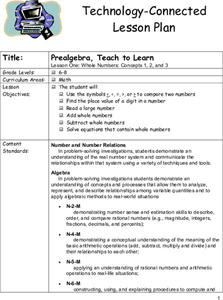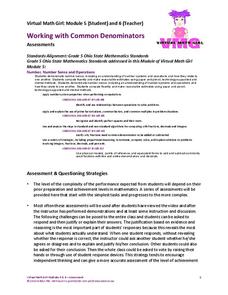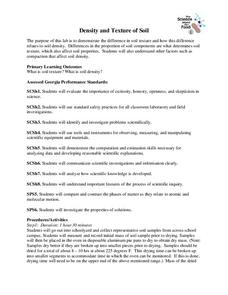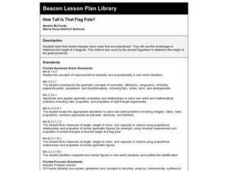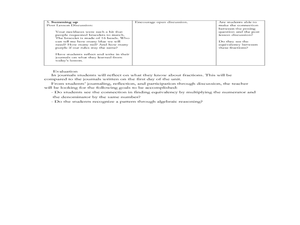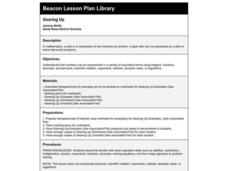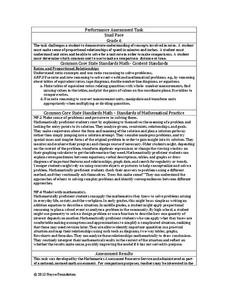Curated OER
Whole Numbers
Student are assigned one of the sections on whole numbers. After reviewing the content, they teach their assigned sections to other class mates. They publish their findings on a PowerPoint slide show to use when they teach their section.
Curated OER
Selling Price
Students work independently to complete a problem solving activity that involves percent. This lesson is designed to be used as an assessment following a unit on percents. Students are presented with a problem involving a store that is...
Inside Mathematics
Marble Game
Pupils determine the theoretical probability of winning a game of marbles. Individuals compare the theoretical probability to experimental probability for the same game. They continue on to compare two different probability games.
Houghton Mifflin Harcourt
Simple and Compound Interest
Your learners will get lots of practice calculating simple and compound interest by the end of this lesson. Simple explanations and examples lead learners through the concepts and steps of calculating simple and compound interest...
PBS
Working with Common Denominators: Assessments
Now that the practice is over, see if young mathematicians can utilize their new skills on finding common denominators and adding fractions. The assessment contains one map challenge and follows with skills practice.
University of Georgia
Density and Texture of Soil
All soil is not created equal! A lab activity asks learners to collect and analyze soil. Specific calculations determine the amount of sand, silt, and clay in a sample and allow individuals to identify the soil texture.
Cold Spring Harbor Laboratory
Some DNA Does Not Encode Protein
Roy John Britten easily earned a PhD in nuclear physics—but he found painting with water colors too difficult. Young scientists learn about Britten's life, career, and research with an online interactive. They read a biography, view...
Curated OER
Comparing Ratios
For this comparing ratios worksheet, students solve and complete 3 different problems using the screens shown. First, they write a ratio that compares the shaded part to unshaded part illustrated. Then, students use the same grid to...
Curated OER
Patterns in Pascal's Triangle
Students examine the patterns that exist in Pascal's Triangle. They explore multiples and factors. Sudents use an applet to create and color the multiples in Pascal's Triangle.
Curated OER
Finding Patterns in Fractals
Students discover patterns and sequences. They use a website to explore patterns and fractals. Students share their discovery of fractals and their patterns with the class. They develop a list of patterns used in everyday life.
Curated OER
Hybrid Vehicles: Cut Pollution and Save Money
Students examine how driving a hybrid car can save money and cut down on pollution. In this hybrid vehicles lesson students complete an exercise that shows them how to work with proportions, percents, dimensional analysis and linear...
Curated OER
How Tall Is That Flag Pole?
Middle schoolers examine various triangles and discuss how similar triangles have sides that are proportional. They utilize an ancient Egyptian method to determine the height of a flagpole.
Curated OER
Mathematics Within: Algebraic Patterns
Students investigate the concept of using proportions to compare quantities while also practicing calculations for foreign exchange rates. They develop the skill of solving for unknown quantities of money while using an algebraic equation.
Curated OER
Scale Me Down
Students create scale drawings, and ultimately scale models, of real-world objects in this Math lesson about ratios, proportion, scaling factors, and cross products. The lesson includes ideas for cross-curricular extensions and is...
Curated OER
Understanding Radios
Fifth graders explore ratios. Using models and real-world scenarios, they complete tables and generate comparisons. Pupils demonstrate multiple ways of writing ratios and describe the differences between ratios.
Curated OER
poem "One Inch Tall" from the book "Where the Sidewalk Ends" by Shel Silverstein
Students use the terms: ratio, proportion, and measurement in their description of the life of a person one inch tall.
Curated OER
Crafty Fractions
Fourth graders study fractions. In this fractions lesson, 4th graders define fraction-related vocabulary words. Students use beads to study fractions. Students draw shapes to study fraction equivalency and brainstorm fractions they use...
Curated OER
Beef Is Good For You
Students discuss as a class the need for a healthy diet. They bring in a food product and analyze the nutrition label. Using the labels, they complete a worksheet and chart the nutrients found in beef. They use a scale to see how...
Curated OER
The Price Is Right - Grocery Store Prices
Eighth graders use the unit price to compare which local grocery store has the best prices. Assign students to work with a partner and a role. One person is the recorder and the other is the mathematician.
Curated OER
Saving Money Through Mathematics
Third graders discuss light sources and collect data about energy sources. They compare data and create a multiple line graph showing energy used by light sources for each student in the group. They present their graphs and write a...
Curated OER
Expected Value
Students discuss what expected value is, they are introduced to the concept of varyting payoffs. Students use a computer simulation of a "real world" example where expected value is used.
Curated OER
Pandemics
Students develop an awareness of the effect of pandemics and acquire knowledge to prevent a pandemic from spreading. In this pandemics lesson plan, students build research skills using a variety of sources. Students investigate...
Noyce Foundation
Snail Pace
Slow and steady wins the race? In the assessment task, scholars calculate the rates at which different snails travel in order to find the fastest snail. Hopefully, your class will move much more quickly in finishing the task!


